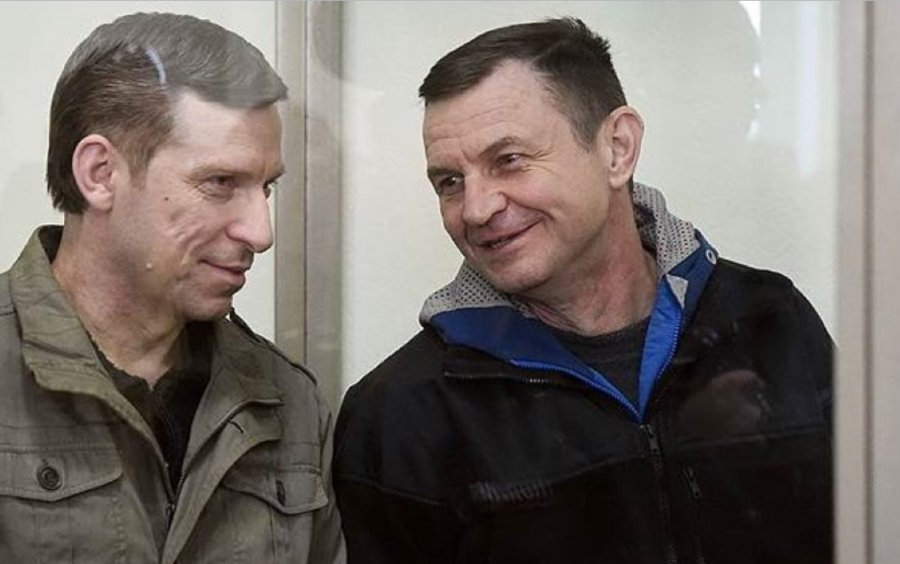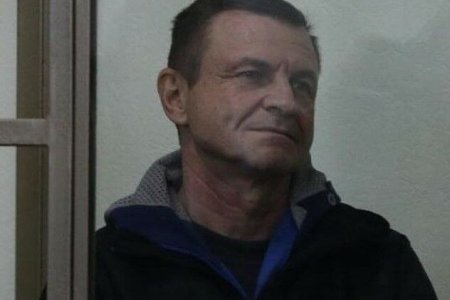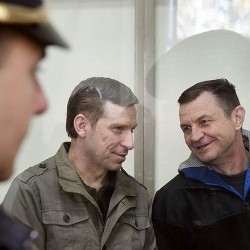
Volodymyr Dudka should have been celebrating his 60th birthday on 30 September with family and friends. The former naval captain and recognized political prisoner is, instead, in a Russian prison colony, serving a 14-year sentence essentially for being Ukrainian. Nationality and a shared Ukrainian naval past were all that Russia’s FSB needed when finding suitable targets for the latest ‘Ukrainian saboteur’ show trial. They did also make sure that the three supposed ‘saboteurs’ from Sevastopol were friends, after Moscow’s first attempt in August 2016 to claim that men who had never set eyes on each other were part of a dastardly ‘Ukrainian plot’ was met with open disbelief.
It is hard to find ‘news’ about three Ukrainians whose lives were taken from them almost eight years ago. They, however, are stripped of any voice, and need ours, if Russia is to be stopped from holding Volodymyr Dudka and Oleksiy Bessarabov prison until November 2030 and Dmytro Shtyblikov until the first half of 2036.
Volodymyr Dudka (b. 1964) was 52 in November 2016 and had recently become a grandfather. He had taken early retirement from his post as captain in Ukraine’s Navy for health reasons and had been on his way to the hospital for treatment of an inflamed stomach ulcer on 9 November 2016, when he was seized by Crimean FSB officers. On that same day, the FSB arrested two of his friends, Dmytro Shtyblikov (b. 1970) and Oleksiy Bessarabov (b. 1976). The two men were colleagues, working as military analysts for the Nomos Centre, a Ukrainian non-governmental think tank on research into geopolitical issues and Euro-Atlantic Cooperation concerning the Black Sea region. Both wrote for, and were on the editorial board of, the journalist Black Sea Security,]and were well-known beyond Ukraine.
The Russian FSB first reported the new arrests on 10 November 2016. No names were given, with it claimed only that “members of a sabotage-terrorist group of the central department of Ukraine’s Ministry of Defence” had been detained. This ‘group’ had, supposedly, been planning to carry out acts of sabotage on military and other infrastructure in Crimea and it was asserted that the FSB had removed “very powerful explosive devices, weapons and ammunition, special communications devices and other significant evidence of criminal activities, including plans of the sites for the intended acts of sabotage”.
No real attempt was ever made to render such grandiose claims about a doting grandfather with health issues and two renowned academics credible. The FSB produced a video of Shtyblikov’s violent ‘arrest’ on the street and of the ‘search’ of his apartment. Nothing illegal at all was shown, with the video camera instead focusing on the Ukrainian flag hanging on the wall, a fake business card purportedly belonging to Dmytro Yarosh, former head of ‘Right Sector’ and ‘weapons’ which sports fans immediately identified as airguns which Styblikov used in the game Airsoft (Strike Ball). The ‘business card’ in question had already aroused back in 2014 when Russian propaganda television triumphantly displayed it, claiming it had been found in the gutted wreck of a car which Ukrainians supposedly attacked.
There was no evidence, only the ‘confessions’ of Shtyblikov and Bessarabov, which both men gave while under FSB control and without lawyers. Both Bessarabov and Dudka have explained that their ‘testimony’ was extracted through torture and demanded, to no avail, that an investigation be carried out.
Shtyblikov, then 46, had been designated ‘leader’ and was subjected to particularly intense pressure. He was effectively never allowed to see an independent lawyer, which was probably the reason why he eventually ‘cooperated’ with the FSB and was sentenced, on 16 November 2017, to five years’ imprisonment. Shortly before that sentence was due to end, new, even more cynical, charges were laid against Shtyblikov, with Russia accusing the Ukrainian academic of ‘state treason’ and sentencing him to sixteen years’ imprisonment (19.5, counting the first sentence) Nore details here..
Both Bessarabov and Dudka, who did have lawyers, retracted all testimony given under torture and remained firm in rejecting the charges. This led to at least one false start with the ‘case’ being sent back to the ‘prosecutor’. It came back with the same evident falsifications. These included supposed ‘biological traces’ from both defendants which the prosecution claimed had been ‘found’ on a map of the city allegedly showing the places where the men were supposed to have been planning acts of sabotage. An independent analysis demonstrated that the traces were only on the edge of the map and not over the entire surface, which would make no sense if this were really, as asserted, a map that the men were using. Both men had previously complained that DNA and other samples had been illicitly extracted without any procedural guarantees. The FSB also claimed to have found telephones, with the implausible story around these condemned by Sergei Legostov, the lawyer representing Dudka as “worse than the shoddiest novel”.
Dudka and Bessarabov were ‘tried’ at Russia’s notorious Southern District Military Court in Rostov. The FSB and prosecutor proved to have correctly assessed the lack of any need to provide credible evidence. On 4 April 2019 ‘judges’ Igor Vladimirovich Kozhevnikov; Vasily Aleksandrovich Avkhimov; and Vladimir Ilych Reshetnyak sentenced both Bessarabov and Dudka to 14 years’ maximum security imprisonment, as well as imposing huge fines. These sentences were upheld by Russia’s Supreme Court on 15 October 2019.
Worth noting that two other men were also arrested shortly afterwards and tortured into giving ‘confessions’ intended to link the men to the same supposed ‘sabotage’ plot. Oleksiy Stohniy was claimed to be an officer of Ukraine’s Military Intelligence [HUR], while Hlib Shabliy was referred to as a Ukrainian officer, a Rank 2 captain in the Ukrainian Fleet. In those cases also the falsification was flagrant, and both men were eventually sentenced on charges that bore scarcely any relation to their ‘confessions’. According to Legostov, the only ‘testimony’ from either of these two men in the ‘trial’ of Dudka and Bessarabov was from Stohniy who said that the last time he had seen Dudka had been in 2003.
The men are all recognized as political prisoners by the Memorial Support for Political Prisoners Project and their release has been demanded by most international structures and democratic countries.
Please write to Volodymyr Dudka and Oleksiy Bessarabov!
Even just a few words will tell them and Russia that they are not forgotten. Letters need to be in Russian, and any political subjects or reference either to the case, or to Russia’s war against Ukraine, should be avoided. If possible, include an envelope and some thin paper so that they can respond.
Addresses
Volodymyr Dudka
355044 Российская Федерация, г. Ставрополь-44, ФКУ ИК-11 УФСИН России по Ставропольскому краю,
Дудка, Владимир Михайлович, 1964 г.р,
[Or in English:
Russia 355044, Stavropol-44, Prison No. 11
Dudka, Vladimir Mikhailovich, b. 1964]
Oleksiy Bessarabov
357000, Российская Федерация, с. Кочубеевское, ФКУ ИК-1 УФСИН России по Ставропольскому краю,
Бессарабов, Алексей Евгеньевич, 1976 г.р
[or in English
Russia 357000, Stavropol Krai, Kochubeyevskoe, Prison No. 1
Bessarabov, Aleksei Yevgenievich, b. 1976 ]
If writing in Russian is a problem, please help publicize this shocking case of political persecution!



